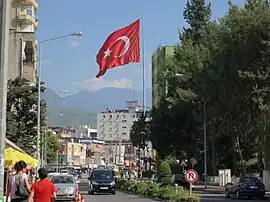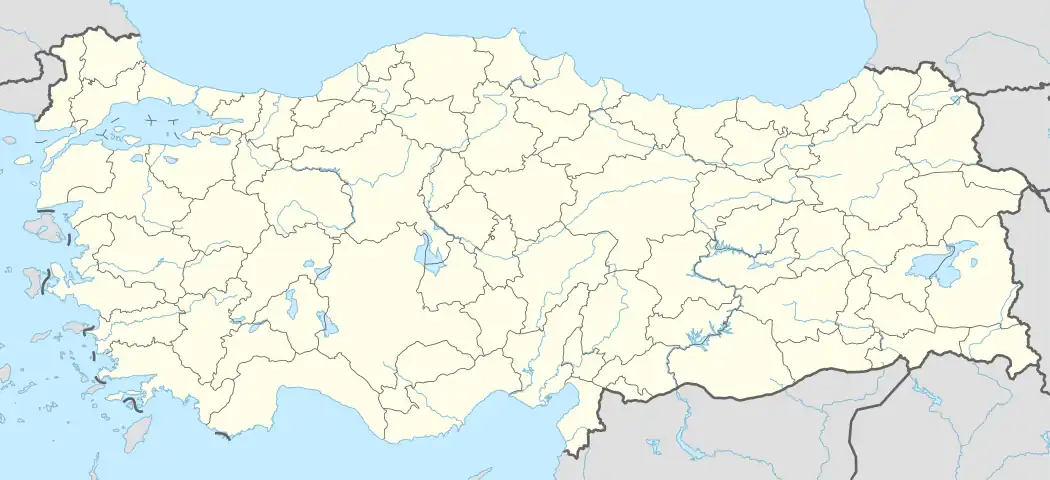Osmaniye
Osmaniye (pronounced [osˈmaːnije]) is a city on the eastern edge of the Çukurova plain in southern Turkey. It is the seat of Osmaniye Province and Osmaniye District.[2] Its population is 252,186 (2022).[1]
Osmaniye | |
|---|---|
 Centre of Osmaniye city | |
 Logo | |
 Osmaniye Location in Turkey | |
| Coordinates: 37°04′30″N 36°15′00″E | |
| Country | Turkey |
| Province | Osmaniye |
| District | Osmaniye |
| Government | |
| • Mayor | Kadir Kara (MHP) |
| Population (2022)[1] | 252,186 |
| Time zone | TRT (UTC+3) |
| Postal code | 80000 |
| Area code | 0328 |
| Website | osmaniye-bld |
Backed by the foothills of the Nur Mountains, Osmaniye lay on one of the old Silk Roads and was always a place of strategic importance since it straddled the main route between Anatolia and the Middle East.
Osmaniye lies at the centre of a rich agricultural region watered by the Ceyhan river and known for growing peanuts. During the intensely hot summers many residents escape either to the Mediterranean coast or into the Nur mountains. The yayla of Zorkun is a particularly popular mountain retreat.
Osmaniye is strongly associated with Devlet Bahçeli, the leader of the MHP, who was its member of parliament for many years.
History
Although Osmaniye was probably inhabited in turn by the Hittites, Persians, Byzantines and Armenians, there is nothing left to show their presence in the modern city.
An Islamic presence was first established by the Abbasid Caliph Harun al-Rashid, auxiliaries in his army being the first Turks to fight in Anatolia. They obviously liked the area and following the Turkish victory over the Byzantines at Malazgirt in 1071 waves of Turkish conquest began. The Nur Mountains were settled by the Ulaşlı tribe of the Turkmens.
The Ulaşlı remained the dominant local power into the period of the Ottoman Empire and were even involved in the Celali uprisings, during a period of crisis for the Ottomans in the 17th century. Eventually, in 1865 the Ottoman general Derviş Paşa was charged with bringing law and order to the Çukurova. He established his headquarters in the Osmaniye villages of Dereobası, Fakıuşağı and Akyar and brought the Ulaşlı down from the mountains to the village of Hacıosmanlı. This eventually became the province of Osmaniye. It was named as Cebeli Bereket during the Ottoman period and was renamed after the formation of the Republic of Turkey in 1923.[3]
Between 1924 and 1933 the city of Osmaniye was the capital of the province of the same name. However, in 1933 the province was abolished and Osmaniye became the district governorate for Adana province. Then in 1996 Osmaniye was reinstated as Turkey's 80th province with the city of Osmaniye as its capital. Since then it has received more investment for infrastructure and now feels more like a city than the market town of old.
Local attractions
Osmaniye town has few attractions for visitors other than the city-centre Kent Müzesi (City Museum).[4] However, it makes a good base for visiting the scant remains of the nearby Roman city of Hierapolis-Castabala which huddles at the base of a craggy rock with a castle, probably built by the Armenians, perched on top of it.[5]

Climate
Osmaniye has a Mediterranean climate (Köppen: Csa, Trewartha: Cs) with very hot, dry summers and mild, wet winters.
| Climate data for Osmaniye (1991–2020, extremes 1987–2020) | |||||||||||||
|---|---|---|---|---|---|---|---|---|---|---|---|---|---|
| Month | Jan | Feb | Mar | Apr | May | Jun | Jul | Aug | Sep | Oct | Nov | Dec | Year |
| Record high °C (°F) | 23.7 (74.7) |
28.0 (82.4) |
32.0 (89.6) |
36.5 (97.7) |
41.7 (107.1) |
42.6 (108.7) |
42.8 (109.0) |
43.6 (110.5) |
45.0 (113.0) |
38.4 (101.1) |
31.0 (87.8) |
29.0 (84.2) |
45.0 (113.0) |
| Average high °C (°F) | 14.5 (58.1) |
16.0 (60.8) |
19.3 (66.7) |
23.3 (73.9) |
27.7 (81.9) |
31.3 (88.3) |
33.4 (92.1) |
34.3 (93.7) |
32.2 (90.0) |
28.4 (83.1) |
21.8 (71.2) |
16.1 (61.0) |
24.9 (76.8) |
| Daily mean °C (°F) | 8.8 (47.8) |
10.1 (50.2) |
13.2 (55.8) |
17.0 (62.6) |
21.3 (70.3) |
25.2 (77.4) |
27.9 (82.2) |
28.6 (83.5) |
25.7 (78.3) |
21.2 (70.2) |
14.6 (58.3) |
10.1 (50.2) |
18.6 (65.5) |
| Average low °C (°F) | 3.8 (38.8) |
4.7 (40.5) |
7.5 (45.5) |
11.0 (51.8) |
15.1 (59.2) |
19.1 (66.4) |
22.6 (72.7) |
23.3 (73.9) |
19.6 (67.3) |
14.6 (58.3) |
8.4 (47.1) |
5.1 (41.2) |
12.9 (55.2) |
| Record low °C (°F) | −8.5 (16.7) |
−6.8 (19.8) |
−4.0 (24.8) |
0.1 (32.2) |
4.6 (40.3) |
11.5 (52.7) |
15.0 (59.0) |
15.0 (59.0) |
7.8 (46.0) |
4.1 (39.4) |
−4.5 (23.9) |
−5.4 (22.3) |
−8.5 (16.7) |
| Average precipitation mm (inches) | 106.5 (4.19) |
99.8 (3.93) |
116.9 (4.60) |
87.2 (3.43) |
74.2 (2.92) |
42.4 (1.67) |
19.8 (0.78) |
10.7 (0.42) |
34.6 (1.36) |
68.1 (2.68) |
86.6 (3.41) |
93.0 (3.66) |
839.8 (33.06) |
| Average precipitation days | 10.87 | 10.57 | 11.33 | 11.27 | 7.97 | 3.57 | 1.73 | 1.43 | 3.97 | 7.23 | 7.30 | 10.20 | 87.4 |
| Mean monthly sunshine hours | 108.5 | 110.2 | 151.9 | 180.0 | 232.5 | 228.0 | 238.7 | 226.3 | 207.0 | 167.4 | 114.0 | 99.2 | 2,063.7 |
| Mean daily sunshine hours | 3.5 | 3.9 | 4.9 | 6.0 | 7.5 | 7.6 | 7.7 | 7.3 | 6.9 | 5.4 | 3.8 | 3.2 | 5.6 |
| Source: Turkish State Meteorological Service[8] | |||||||||||||
References
- "Address-based population registration system (ADNKS) results dated 31 December 2022, Favorite Reports" (XLS). TÜİK. Retrieved 13 March 2023.
- İl Belediyesi, Turkey Civil Administration Departments Inventory. Retrieved 1 March 2023.
- Kathryn Libal (2015). "Child Poverty and Emerging Children's Rights Discourse in Early Republican Turkey". In Benjamin C. Fortna (ed.). Childhood in the Late Ottoman Empire and After. Vol. 59. Leiden; Boston: Brill. p. 52. ISBN 978-90-04-30580-9.
- Yale, Pat. "Osmaniye".
- Yale, Pat. "HİERAPOLİS-CASTABALA".
- "Present and future Köppen-Geiger climate classification maps at 1-km resolution". Nature Scientific Data. DOI:10.1038/sdata.2018.214.
- "Present and future Köppen-Geiger climate classification maps at 1-km resolution". Nature Scientific Data. DOI:10.1038/sdata.2018.214.
- "Resmi İstatistikler: İllerimize Ait Mevism Normalleri (1991–2020)" (in Turkish). Turkish State Meteorological Service. Retrieved 7 August 2021.
External links
- (in Turkish) Osmaniye municipality's official website
- (in English) Osmaniye weather forecast information
- (in Turkish) Osmaniye fm radio website
